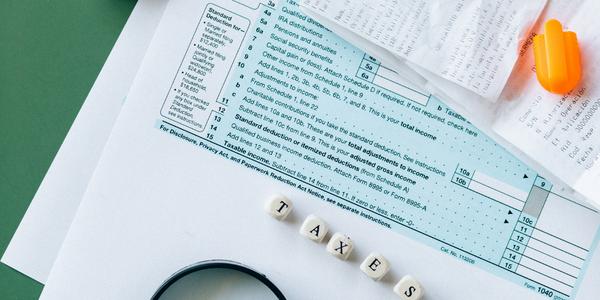Life comes at you fast—and sometimes, that includes car accidents. One minute you’re driving along, minding your own business, and the next minute you’re dealing with injuries and property damages.
And while you may be focused on the physical and emotional aftermath of the accident, it’s important to also think about the financial implications. One of the first questions you may have is whether or not your insurance settlement is taxable. Unfortunately, there’s no easy answer.
The taxability of auto accident insurance settlements depends on a number of factors, including the state in which the accident occurred and the type of damages you received. To help you better understand how auto accident insurance settlements are taxed, our Atlanta car accident lawyers have compiled a list of the most important things you need to know.
[joli-toc]
The Relevant IRS Rule That Applies to Auto Accident Settlements
Publication 4345 (Rev. 11-2021) — According to IRS Publication 4345, “any settlement, judgment, award, or other payment you receive for your personal physical injury or physical sickness” is exempt from taxation.
However, it’s important to note that this rule applies only to physical injury or physical sickness, not to property damage or other damages such as mental anguish, emotional distress, or punitive damages.
In other words, if you receive a settlement for medical bills and property damage, the amount you receive for medical bills will not be taxed, but the amount you receive for property damage will be taxable.
This is because the IRS considers medical expenses to be a personal physical injury or physical sickness, while property damage is not.
Taxes on Car Accident Settlements – Here Is What You Need to Know
Now with the basics out of the way, let’s talk about how state taxes apply to auto accident settlements.
Generally speaking, states will tax any settlement you receive for property damage, but not for personal injury or physical sickness. But there is more to it than that. Here are some things you need to know about state taxes and auto accident settlements:
Car Insurance Settlement for Repair or Replacement of Car or Other Property (Tax-Exempt)
You do not have to pay state taxes on any portion of an insurance settlement that you use to repair or replace your car or other property that was damaged in the accident. This comes as a relief to many people, as it means they do not have to pay taxes on the money they receive to repair or replace their vehicle that was damaged in an accident.
Car Insurance Settlement for Personal Injury or Sickness (Taxable in Most Cases)
If you receive a settlement for personal injury or physical sickness, it is generally taxable in most states. For best results, you should consult with a tax professional in your state to determine the specific tax treatment of your settlement.
Interest Earned on Your Settlement (Taxable)
Any interest that you earn on your settlement is generally taxable. For example, if you receive a $10,000 settlement and put it in a savings account that pays 5% interest, you will owe taxes on the $500 in interest that you earn over the course of the year.
Auto Insurance Settlement for Medical Bills (Tax-Exempt)
If you receive an auto insurance settlement for medical bills, it can be tax-exempt. This means that you will not have to pay taxes on this money. It is important to note that the IRS has very specific rules regarding what is considered a “medical expense” and what is not. If you have received an insurance settlement and are unsure as to whether it is taxable or tax-free, you should consult with a professional tax advisor before filing your taxes.
Reducing the Tax Owed on Your Car Insurance Settlement
There are a few things you can do to reduce the amount of taxes you owe on your car insurance settlement.
Structured Auto Insurance Settlement
One option is to structure your settlement so that the portion that is for personal injury or physical sickness is paid out over time rather than in a lump sum. This can help to reduce the taxes you owe, as you will only be taxed on the portion of the settlement that you receive each year. Moreover, you may be able to deduct your medical expenses (which are tax-deductible) from the portion of the settlement that is taxable.
Classifying Damages in Your Car Insurance Settlement
Another way to reduce the taxes you owe is to carefully classify the damages in your settlement. For example, if you have $10,000 in medical bills and $5,000 in property damage, you can request that the $5,000 be classified as “property damage” rather than “medical expenses.” This will make the $5,000 taxable but the $10,000 tax-free.
Frequently Asked Questions About Auto Insurance Settlements
Is Interest Earned on Your Car Accident Settlement Taxable?
Yes, interest earned on your settlement is generally taxable. Under Publication 4345 (Rev. 11-2021) by the IRS, any interest you earn on your settlement is considered taxable income and hence must be reported on your tax return.
Are Punitive Damages in an Insurance Settlement Taxable?
Punitive damages are generally not taxable. However, if you received punitive damages in addition to compensatory damages (such as medical bills and lost wages), the IRS may consider such a settlement taxable.
Are Property Damage Settlements Taxable?
The answer depends on the type of property damage settlement. If you received a cash settlement from the at-fault driver’s insurance company, this is generally taxable income. However, if your settlement includes property such as a vehicle or other valuable item that was damaged in an accident and replaced with another one, this is not considered taxable income.
Contact Our Auto Accident Lawyers Today
If you have been injured in an auto accident or have suffered property damage resulting from another driver’s negligence, contact the experienced personal injury attorneys with Mabra Law Firm today. We can help you file a claim with the insurance company and negotiate a fair settlement.
To schedule a free case evaluation, call us at (404) 344-5255.




